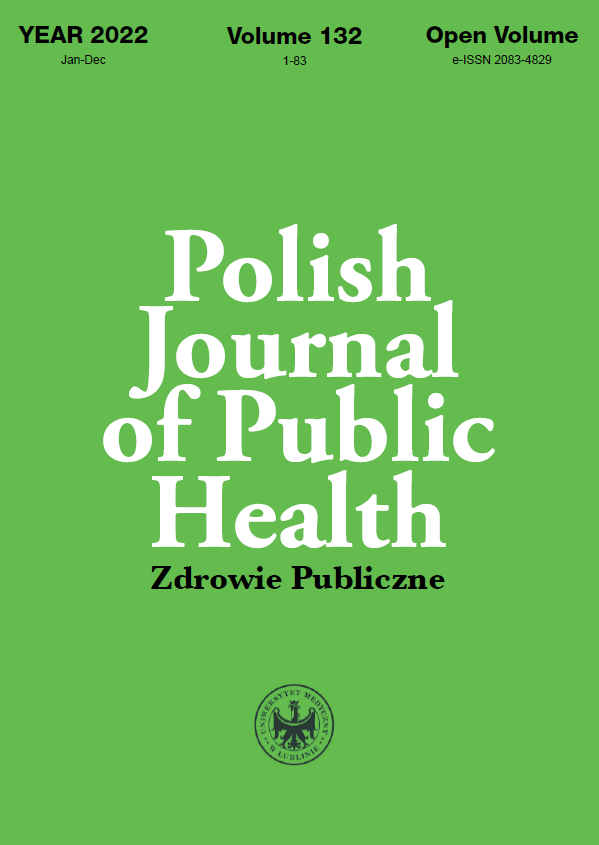The survey of the opinion of the management of Disability Adjudication Teams in Poland on the reform of adjudication on disability
DOI:
https://doi.org/10.2478/pjph-2022-0009Keywords:
reform, adjudication, disabilityAbstract
Introduction. Adjudication of disability in Poland is carried out by independent institutions, operating within the framework of various judicial systems and on the basis of different legal regulations. In 2017, an inter-ministerial team was appointed whose task was to develop a coherent and modern system of adjudicating on disability and inability to work.
Aim. The aim of the study was to obtain the opinion of the management of Disability Adjudication Boards in Poland whether there is a need to reform the certification of disability.
Material and methods. The research questionnaire was sent to 294 boards. In total 66 responses were obtained, which is 23.5% of the invitations.
Results. Over 65% of respondents indicate the need for reform, while 28.8% believe that the reform is unnecessary. The weaknesses of the current system include the inability to recruit appropriate doctors and specialists – 90.9%, insufficient financing of teams – 81.8% and staff shortages among full-time employees – 57.6%. Fewer respondents indicate unclear criteria for assessing disability – 47% and poor preparation of assessments – 21.2%. The strengths of the system are dominated by organizational factors: employee preparation – 77.3%, organizational stability of the system – 59.1% and locating teams in the local government structure – 51.5%. The following factors can be considered as substantive: stability of regulations – 39.4% and quality of jurisprudence – 34.8%.
Conclusions. Majority of the respondents see the need for the reform of adjudication on disability. The greatest problems of disability adjudication boards in Poland are: difficulty in specialists’ recruitment and insufficient financing.
References
1. Kłos B. Systemy orzecznictwa o niezdolności do pracy i orzecznictwo o niepełnosprawności w Polsce. Studia BAS. 2015;2(42):11.
2. Głąb Z, Kurowski K.W poszukiwaniu nowego systemu orzekania o niepełnosprawności w świetle Konwencji ONZ o prawach osób niepełnosprawnych i idei niezależnego życia. Studia z Polityki Publicznej. 2018;4(20):23-43.
3. Regulation No. 6 of the Prime Minister of February 2, 2017 on the Inter-ministerial Team for the Development of the Disability and Inability to Work Assessment System, M.P. 2017 item 167.
4. [https://bip.brpo.gov.pl/pl/content/jak-wygladaja-prace-nad-reforma systemu-orzecznictwa-ws-niepelnarańnosci-mrips-odresponse] (access: 25.08.2022)
5. The Letter BON-IV.070.122.2021.AP. https://bip.brpo.gov.pl/sites/ default/files/2021-09/Odpowiedz_MRiPS_22.09.2021.pdf] (access: 22.09.2022).
6. § 21 of the Ordinance of the Minister of Economy, Labor and Social Policy of July 15, 2003 on the ruling on disability and the degree of disability. Journal of Laws 2021.857.
7. The Report on the results National Census of Population and Housing 2011 Central Statistical Office Warsaw; 2012. People with disabilities and their households 2002. Central Statistical Office, Warsaw; 2003.
8. Raudsaar M, Kaseorg M. Social entrepreneurship as an alternative for disabled people. J Business Rev. 2014;2(3):120-5.
9. Bańczyk P, Eichner M, Pasternak K, Tulaja J. Model aktywizacji zawodowej osób bezrobotnych z różnymi typami niepełnosprawności. Centrum Społecznego Rozwoju; 2015.
10. Berthoud R. Trends in the employment of disabled people in Britain. University of Essex, Institute for Social and Economic Research; 2011.
11. Laboratorium Badań Społecznych, Badanie sytuacji warsztatów terapii zajęciowej. Raport końcowy z badania. Warszawa; 2014. [https:// www.pfron.org.pl/pl/publikacje/badania-i-analizy-pfro/77] (access: 22.09.2022).
Downloads
Published
Issue
Section
License
Copyright (c) 2022 Authors

This work is licensed under a Creative Commons Attribution-NonCommercial-NoDerivatives 3.0 Unported License.


